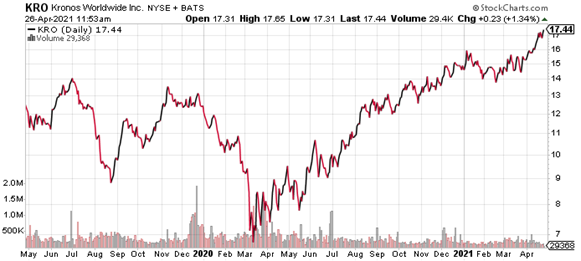When we think of titanium, many of us picture the metal used to make NASA spacecrafts and high-end tennis rackets — but that’s just the tip of the iceberg, asserts Sean Brodrick, growth stock expert and editor of WealthWave.
Titanium is 45% lighter than steel but just as strong. Titanium alloys — which contain other metals like aluminum, steel and stainless steel — have high resistance to fatigue, cracking and high temperatures.
They’re not only ideal for high-stress military applications and sports equipment, they’re also used for pipes and industrial equipment due to their ability to resist corrosion — and that’s also the reason why containers made of titanium are being looked at for long-term storage of nuclear waste.
And because titanium is biocompatible (nontoxic and not rejected by the body), it has a host of medical uses. Some examples include surgical tools and implants, such as hip balls and sockets (joint replacement), and dental implants that can stay in place for 20 years or more. It’s even used in semiconductors and computer chips.
But while it’s the ninth-most abundant element in Earth’s crust, pure titanium is very rare. Most exists as titanium dioxide.
The thing is, pure titanium can’t be easily produced from titanium dioxide. The complexity of the purification process explains the high market value of titanium metal.
But titanium dioxide has incredible value on its own. Heck, this stuff must have a million uses in today’s world It has the highest refractive index (how much a material stops light) of any material known to man.
Titanium-dioxide pigments are used in paints and coatings, plastics, paper, building materials, cosmetics, toothpaste, pharmaceuticals, foods and many other commercial products. Its resistance to UV rays also makes it a common ingredient in sunscreens.
And titanium-dioxide coatings improve concrete, ceramics, floor coverings, roofing materials and more. Plus, these coatings make renewable infrastructures cheaper to produce while helping to remove pollution and reduce waste. And, as a bonus, they lower the cost of generating solar energy via dye-sensitized solar cells.
Titanium is an investment you shouldn’t ignore. As the world advances, so will demand for this high-tech metal in all its forms — especially now with President Joe Biden calling for an epic expansion of renewable energy technology.
The best way to invest in titanium is to buy stocks in companies that either mine the metal or use it to produce their products. This list will also include the companies that produce the all-important titanium-dioxide.
Some 70% of the world’s titanium dioxide is controlled by an “oligopoly” of just seven companies — and Kronos Worldwide, Inc. (KRO) is one of the most dominant.
The company supplies titanium-dioxide to chemical coating companies globally. And it stands to reap the rewards from the increase in infrastructure investment I’ve been harping on.
Couple industrial sectoral tailwinds and a strong dividend payout … with insider buying, I might add … and you have a cocktail of catalysts acting like a rocket booster underneath this stock.

It’s just broken above the high made on Jan. 7; it could easily test $19 and then $20. And that’s just in the short term. This stock could climb much, much higher.
Momentum is on the stocks’ side. Plus, the company’s earnings on March 10 blew out expectations. And quarterly revenues of $415 million surprised analysts.
It helps that KRO’s dividend pays a solid 4.8% annually, and its payout is expected to grow 2% per year over the next three years. This stock looks like it has a strong possibility to be on a rocket ride to the stars!










